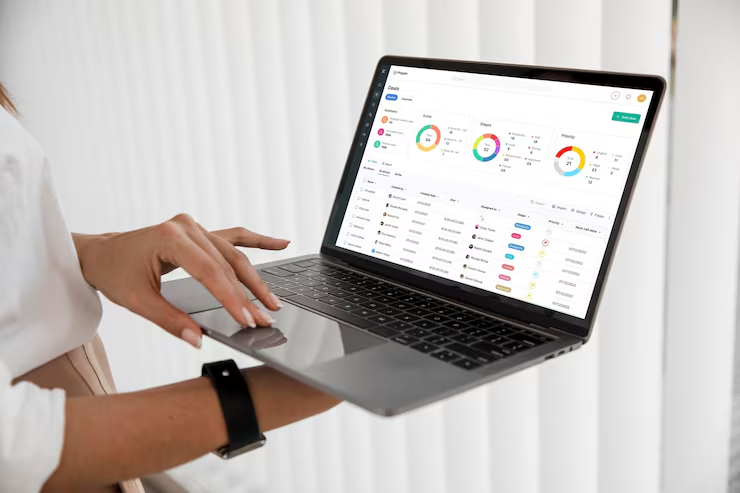In today’s regulatory environment, businesses in South Africa face ever-evolving compliance requirements. Whether it’s managing environmental regulations, occupational health and safety, or legal obligations, companies need reliable tools to stay ahead. This is where compliance dashboard and analytics play a critical role.
At Ariscu, we specialize in providing advanced compliance and risk management solutions tailored to South African businesses. Our professional services include the integration of compliance dashboards and analytics tools that help organizations track performance, assess risks, and ensure adherence to regulatory frameworks.
For businesses seeking a more detailed look at risk management, our previous blog on legal compliance and risk management in South Africa provides deeper insights into why compliance is not just a legal requirement, but also a strategic necessity.
What is a Compliance Dashboard and Analytics?
A compliance dashboard is a centralized digital interface that consolidates compliance-related data into visual summaries. These dashboards give managers a real-time view of their organization’s compliance status, risks, and performance indicators. Instead of navigating multiple reports or spreadsheets, decision-makers can instantly see whether they are meeting legal and internal compliance requirements.
Analytics, on the other hand, refers to the tools and methodologies used to analyze compliance data. With the help of advanced analytics, organizations can detect patterns, predict risks, and identify areas of improvement. When combined, a compliance dashboard and analytics provide a powerful toolset for proactive compliance management.
Why Compliance Dashboard and Analytics Matter in South Africa
South Africa’s regulatory landscape is complex, with laws spanning health and safety, environmental sustainability, corporate governance, and labor rights. Failure to comply not only leads to financial penalties but also damages reputations and stakeholder trust.
A compliance dashboard and analytics system helps organizations by:
- Offering real-time insights into compliance performance.
- Automating reporting to reduce administrative burdens.
- Highlighting areas where businesses risk non-compliance.
- Supporting better decision-making with data-driven analysis.
For South African companies, where regulations often vary across industries, having a central compliance hub ensures nothing falls through the cracks.
Key Features of an Effective Compliance Dashboard and Analytics System
When evaluating compliance dashboard and analytics solutions, businesses should look for these core features:
1. Real-Time Monitoring
An effective dashboard should display compliance metrics in real-time, allowing immediate responses to potential risks.
2. Customizable Reporting
Every industry faces unique compliance challenges. Customizable reports ensure that businesses focus on the KPIs that matter most.
3. Automated Alerts and Notifications
Automated alerts notify stakeholders when issues arise, reducing delays in corrective action.
4. Integration with Existing Systems
Dashboards that integrate with HR, legal, and operational systems streamline compliance monitoring across the organization.
5. Predictive Analytics
By leveraging predictive analytics, businesses can foresee risks before they escalate, enabling proactive compliance strategies.
Benefits of Compliance Dashboard and Analytics for Businesses
Implementing a compliance dashboard and analytics solution can bring transformative benefits, especially in the South African market:
- Improved Efficiency: Eliminates manual reporting and reduces administrative workloads.
- Risk Reduction: Identifies potential compliance breaches before they become costly.
- Transparency: Enhances accountability across departments and stakeholders.
- Data-Driven Decisions: Empowers leadership with clear insights for compliance strategies.
- Competitive Advantage: Demonstrates strong governance and regulatory adherence to clients and investors.
Compliance Challenges in South Africa
South African businesses face unique compliance challenges that make dashboards and analytics particularly valuable. These include:
- Complex legislation such as the Occupational Health and Safety Act, Environmental Management Acts, and labor laws.
- Frequent regulatory updates, requiring constant monitoring and adjustment.
- Resource constraints, particularly for small and medium-sized enterprises (SMEs).
- Risk of penalties and litigation, which can be severe for non-compliance.
A robust compliance dashboard and analytics system addresses these challenges by simplifying monitoring, automating updates, and ensuring all stakeholders remain informed.
How Ariscu Supports Compliance Dashboard and Analytics
At Ariscu, we provide South African organizations with end-to-end compliance management solutions. Our professional services ensure that businesses have access to:
- Custom-built dashboards tailored to industry-specific compliance needs.
- Advanced analytics tools that deliver actionable insights.
- Integration support for seamless adoption across existing systems.
- Expert guidance to navigate South Africa’s regulatory frameworks.
By partnering with Ariscu, businesses don’t just stay compliant—they gain a strategic advantage in managing risk and building stakeholder confidence.
Practical Steps for Implementing Compliance Dashboard and Analytics
For South African companies considering a compliance dashboard and analytics system, the following steps can help ensure a successful implementation:
- Conduct a compliance audit to identify current gaps.
- Define KPIs that align with business goals and industry regulations.
- Select a solution provider like Ariscu that offers customization and integration.
- Train employees to use dashboards effectively.
- Continuously review and update dashboards to reflect regulatory changes.
FAQs on Compliance Dashboard and Analytics
What is a compliance dashboard and analytics?
A compliance dashboard is a centralized platform that displays compliance metrics, while analytics provides insights from that data to improve risk management.
Why is compliance dashboard and analytics important for South African companies?
It ensures organizations meet local laws, reduce risks, and improve governance while saving time on manual compliance tracking.
How does Ariscu help with compliance dashboard and analytics?
Ariscu offers tailored dashboards, advanced analytics, and expert guidance to support South African companies in managing compliance effectively.
What laws affect compliance dashboard and analytics in South Africa?
Key laws include the Occupational Health and Safety Act, Environmental Management Acts, and labor regulations impacting multiple industries.
How can businesses implement compliance dashboard and analytics effectively?
By auditing compliance gaps, setting clear KPIs, choosing a trusted provider like Ariscu, and training teams for adoption.
Conclusion
In a complex regulatory environment like South Africa, compliance dashboard and analytics are not just tools—they are business necessities. They empower organizations to streamline compliance, reduce risks, and strengthen governance. With Ariscu’s professional services, businesses gain tailored solutions that ensure compliance while unlocking strategic value.
For companies committed to sustainable success, adopting compliance dashboards and analytics is a step toward smarter, data-driven compliance management.







